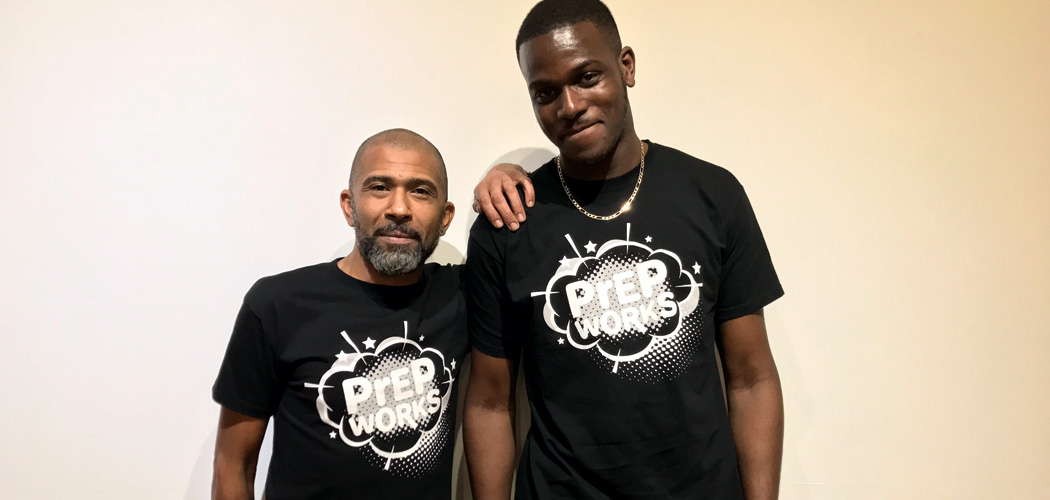Peer mentor and outreach worker Marc Thompson was giving out Prepster resources at UK Black Pride back in July when he met Phil Samba, a writer and activist. They now work together on Blackout UK projects. Marc, 48, has been HIV positive for 31 years, Phil, 27, is negative and on PrEP. Luke Till got them together to exchange questions about intergenerational issues that affect and impact the gay black male community.
Phil: Marc, what was it like being diagnosed with HIV before I was born?
Marc: Being diagnosed in 1986 was tough. There was no treatment available. HIV stigma was a lot higher than it is now. And there was no prognosis, apart from being ill and probably dying, and that was really scary and frightening because not only were you dealing with HIV at a time that was really scary, but I was really young. And being young and just coming out, that had its own pressures. But there was still hope, because I had a really good community and a family who were really supportive, and that allowed me to get to grips with getting hold of the limited information that was available at the time.
M: Phil, what is the conversation in the community of young black gay men around HIV and how are you part of those conversations?
P: Well I’m on the Impact trial but a lot of young gay black men have no idea about PrEP, they have no idea how it works, they have no idea that there is a trial, so I’m trying to inform a lot of them with my writing and activism.
M: Do you think that a lot of young gay black men – even if they knew about the trial – do you think that some young black gay men might think that they’re not actually at risk of HIV?
P: Definitely.
M: Why do you think that might be?
P: I’m not sure. I think they think they’re not at risk because they trust the people that they’re with. They feel like it’s not going to affect them.
M: As a young activist, how do you think we might raise their awareness? What things could we do to help them understand that PrEP is for them?
P: I think there needs to be more gay black spaces in the community, like there used to be, because otherwise there is nowhere to learn from. They get all their resources from the internet and they might not be looking in the right places or searching for the right things or speaking to the right people.
Luke: Incidentally, is there a social group for young black gay men to meet older black gay men?
M: There’s no physical space. There are one or two clubs.
L: But aside from clubbing, where you’d be drinking and dancing and not doing much talking, is there a discussion group?
M: No.
P: If that’s how it is in London, what’s it like out of London?
M: That’s an interesting one because actually there are some amazing groups where gay black men can come together outside of London. I think what’s happening is, for younger men and older men of colour, we’re connecting online. There’s a Facebook group that’s just started which has over 700 queer men of colour in there, so there’s online spaces, no physical spaces. But then I don’t think there are spaces for anybody in our community to have those conversations outside of a bar, regardless of ethnicity, and that’s a real shame, for all of us.
P: Marc, what is it like for a young person to be diagnosed today?
M: The difference now is there’s a lot of hope. You can start treatment straight away, your condition will be managed, you’ll become undetectable and you won’t pass HIV on. So anybody diagnosed today has a really good chance to live to a ripe old age, as long as you take your meds you can’t pass HIV on. But, clearly, stigma remains. We’ve got a lot better at challenging it in our community, but the stigma has shifted now to being online, so we’ve still got a lot to do.
M: How do you think we can get more young black gay men involved and made aware about PrEP?
P: I think education. One of my followers yesterday messaged me and he has no idea about undetectable and viral loads and things like that, so I sent him GMFA’s ‘Undetectables’ video and that helped him. I think when people don’t know anything then they’re afraid. People need to learn more.
M: And finally, Phil, do you think we’re going to see the end of HIV in the UK?
P: I think possibly, in my lifetime. I think we’re on the right track.
M: I have some cynicism but I hope that we see the end of HIV. Like you say, we are definitely going in the right direction. It’s great we have people on the Impact trial, but eliminating HIV needs to be a combination approach, so we need to make sure more people are tested, more people get on to treatment and become undetectable, and also that we understand what the needs are of those who are most vulnerable, because my standing line is, if we get to the end of Impact trial and we see those figures and it’s only white gay men where HIV has gone down and not African men or Asian men, then the trial hasn’t been as successful as one would hope. But I’m hopeful.














